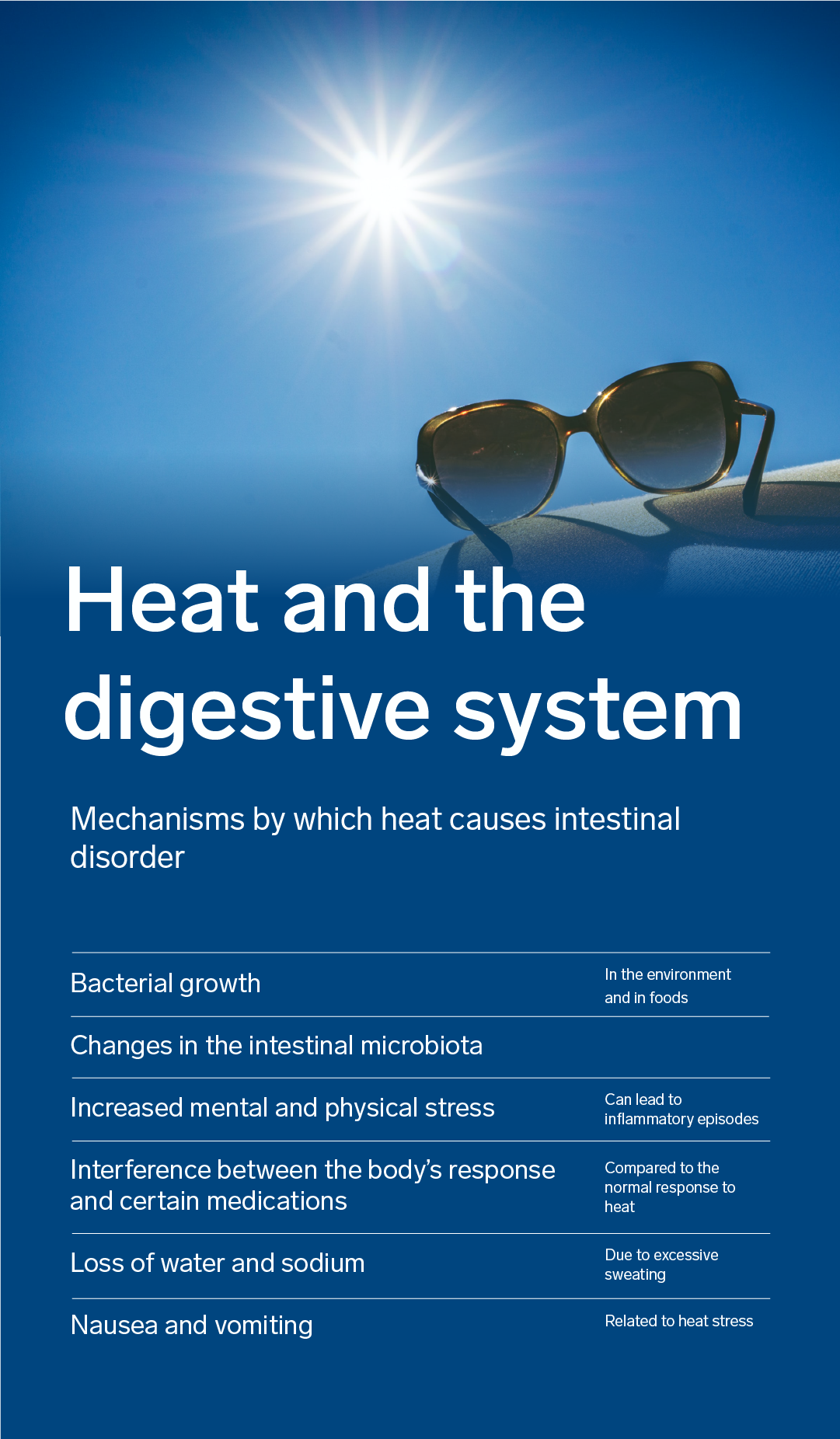Specialist Advice — 14 minutes
When intense heat leads to abdominal pain

With global warming becoming more pronounced, heat waves are getting more frequent, longer and more intense. In the summer, the pressure of this oppressive heat on our bodies increases and has an impact on the population’s overall health. Among the effects observed, there has been an increase in the number of cases of abdominal pain during hot weather.

Abdominal pain can take many forms
There are many different types of abdominal pain, as well as the mechanisms that cause them. Some of these problems are especially prone to being worse during the summer months.
Inflammatory bowel disease (IBD)
The causes of IBD, including Crohn’s disease and ulcerative colitis, are not fully understood, but genetics, autoimmune disorders and environmental factors are often cited as reasons for the onset of these chronic illnesses.
Infectious gastroenteritis (IG)
IG may be viral, bacterial or parasitic in origin and is usually short-lived. Episodes of diarrhea, often combined with nausea and vomiting, can lead to dehydration.
Nausea and vomiting
Disorders of the digestive tract can lead to nausea and vomiting, which can also be caused by situations not involving digestion, such as pregnancy, medication, seasickness, migraines, etc.
More hospitalizations for abdominal pain during heat waves
According to a 2013 study from Zurich Hospital published in the American Journal of Gastroenterology, hospitalizations for inflammatory bowel disease (IBD) or infectious gastroenteritis (IG) grew by 4.7% for each additional day of heat wave.
To reach this conclusion, the research team compared the number of hospital admissions for IBD and IG between 2001 and 2005 with the number of heat wave days during the same periods. They found that there was a surge in IBD and IG cases during heat waves. While hospitalizations for IBD happened during the first days of the heat wave, those associated with IG were higher about a week later, suggesting different mechanisms in the two situations.[1]
In Canada, a heat wave is defined as a period of three consecutive days when the daytime temperature exceeds 30 degrees Celsius. Classifications vary from country to country and sometimes even region to region.
In Quebec, no study has yet been done on the impact of heat on abdominal pain. However, the effects of heat waves on ambulance trips, hospitalizations and mortality have been well documented. In particular, authorities have noted a substantial increase in deaths and hospitalizations during the summer of 2010, one of the hottest in recent decades, during which no less than nine heat waves were recorded.[2]
According to Christine Manser, head of the study conducted in Zurich, heat causes major mental and physical stress, which may be the cause of aggravation of IBD symptoms. In addition, a change in the intestinal flora due in part to heat-induced food damage is believed to be responsible for IG.[3]
More generally, heat can result in different reactions in the body, including the digestive system.[4]

How to spot the symptoms of heat-related illness
In hot weather, the specific symptoms of IBD or IG are nausea, vomiting and abdominal cramps of varying severity.
More generally, heat causes various symptoms that may require the attention of health-care specialists. These symptoms may be related to impaired consciousness or heat stroke, for example.
Signs of impaired consciousness:
- Confusion
- Unusual behaviour
- Restlessness
- Hallucinations
- Lack of response to stimuli
- Loss of consciousness
Signs of heat stroke:
- Temperature over 39.5 °C (103.1 °F) on an oral thermometer or over 40 °C (104 °F) on a rectal thermometer
- Skin that is dry, red and hot, or pale and cold
- Dizziness or vertigo
- Confused and illogical speech
- Aggressive or bizarre behaviour
- Generalized feeling of faintness
Heat stroke is the most serious complication of a heat wave. It can happen suddenly and may lead to death in the very short term if not treated immediately.
How to cope with heat waves and prevent abdominal pain
To avoid microbial contamination in the summer, it is essential to properly rinse fruit and vegetables before eating them, and to not break the cold cycle between the grocery store and your refrigerator.
- Use cooler bags to store groceries.
- Avoid stopping at other stores after the grocery store.
- Buy frozen meats (the freezing process guarantees bacteria-free meat that can better withstand transportation).
In the event of abdominal pain, it is important to stay well hydrated and even cool down. If the pain persists, a medical appointment may be needed to obtain antibiotics or anti-inflammatories.
More generally, it is important to be well prepared for heat waves, not only for yourself, but also your loved ones who may be more vulnerable (e.g. children and the elderly). Health Canada’s website provides all the information you need to prepare for these periods, the most important being to stay properly hydrated.
It is also important to pay attention to the various symptoms of heatstroke (listed above) so that you can react quickly.
For professional support, we’re here for you.
We provide services that can help your doctor diagnose the source of your stomach pain and related health problems and determine the appropriate treatment.
Do you have a medical prescription for this test? Book an appointment online or contact Biron Health Group’s customer service at 1 833 590-2712.
Sources4
- “Heat waves, incidence of infectious gastroenteritis, and relapse rates of inflammatory bowel disease: a retrospective controlled observational study.” The American Journal of Gastroenterology. September 2013. https://pubmed.ncbi.nlm.nih.gov/23939628/
- “Analyse des impacts des vagues régionales de chaleur extrême sur la santé au Québec de 2010 à 2015.” Institut national de santé publique. 2017. https://www.inspq.qc.ca/sites/default/files/publications/2221_impacts_vagues_chaleur_extreme_sante.pdf
- “Vagues de chaleur et maux de ventre vont de pair.” 20 Minutes. August 2013. https://www.20min.ch/fr/story/vagues-de-chaleur-et-maux-de-ventre-vont-de-pair-398608061694
- “Chaleur accablante et usage de médicaments – Étude exploratoire en Estrie”. Albert C, Proulx R, Richard P. June 2006. Chaleur accablante et usage de médicaments – Étude exploratoire en Estrie | Bulletin d'information en santé environnementale | INSPQ









